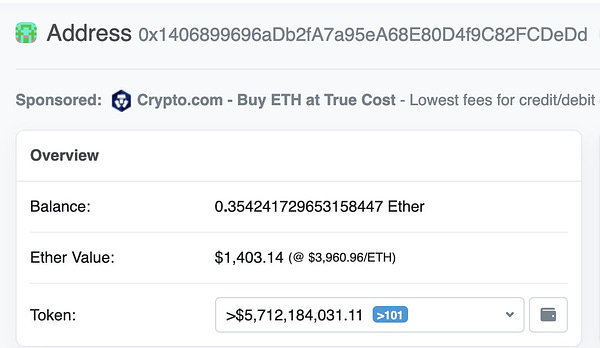This week, I wrote about the rise of Kirk Kerkorian who parlayed his way up from war surplus planes to owning entire airlines, much of the Las Vegas strip, and the MGM studio. He rode a powerful trend, growth in leisure spending, and applied his vision, dealmaking skills, and plenty of leverage. What did he do after building and losing Vegas’s biggest hotel? He immediately built an even bigger one.
While Kerkorian was generally cool-headed, he also loved to gamble. And I think he would have smirked at the speculative enthusiasm visible today. We are long past the moment of bored people under COVID lockdown gambling in stocks because there was nothing else to do. Meme stocks, a Trump SPAC, a flood of crypto projects (some legit, some not) – there is seemingly infinite demand for speculative assets.
I wonder if this wave of greed is really driven by fear - fear of missing out on one last chance to get rich and escape the race. I mean, how often can you turn a few thousand dollars into billions? Who knows how long this will last?


It all reminds me of Netflix’s Squid Game, a show about the losers of society: Indebted, haunted, always looking over their shoulders in an economic struggle they can’t seem to win. The show’s premise is that they get one last shot at a fair game. Win a big pot of money or die trying. YOLO.
But what is presented to the contestants as a fair game is rigged at the meta level. It’s a game created for the entertainment of those who won the money game in the real world. The contestants get their chance at salvation only at the cost of taking absurd risks.
Obviously, the stakes are lower in markets. But a similar mix of greed and fear may be at play. There is a chance at life-changing money. Yacht money. Going to space money.
The alternative is the hard work and anxiety of competing in a rapidly changing economy dominated by oligopolies. Higher inflation would turn up the pressure even more, especially when it moves from areas like education and healthcare to things you really need, like housing, food, and energy. And what Jim O’Shaughnessy calls the Great Reshuffle, the collapse of “time, space, and geography” in a digitized world, means that intensifying global competition is coming for knowledge workers.
Long-term investors used to pride themselves on “not watching CNBC” or not having a Bloomberg terminal. But today, the money game has conquered all platforms. Forget TV: it’s on Youtube, Twitter, and TikTok. It’s in your groupchat, your email, and on your podcast playlist. The lucky winners get to leave the deadly contest and broadcast their success. The losers have to come to terms with the idea that it could have been them. That it was not that rocket science after all.
In Wanting, Luke Burgis compared Celebristan and Freshmanistan. You tend not to be envious of people like Buffett or Zuckerberg. They are distant and clearly outliers. But if a neighbor, co-worker or cousin gets rich from made-up funny dog coins, it’s only reasonable to experience an emotional reaction. You might as well join the game. You might as well take that adrenaline-infused long shot that could be the ticket to the good life (probably not, but maybe).
You think of yourself as a contestant with a fair shot on goal. But your struggle to reach the exit is the entertainment. You become the engagement. The lines between investing and entertainment are blending. The absurd becomes real and the dream refuses to end.
The most important choice you make is which game to play. More than ever, you have to carefully consider what is right for you and avoid becoming trapped in somebody else’s twisted designs.
(Check out the ever thoughtful Liberty on investing as a lifestyle and what to optimize for.)
Remember.
“I don't have to make money in every game. There are all kinds of things I don't know about. In the securities business, you literally every day have thousands of major corporations offered to you at a price. And you don't have to make any decisions. Nothing is forced upon you. There are no called strikes in the business.
They throw US Steel at 25, General Motors at 16. And you don't have to swing at any of them. They may be wonderful pitches to swing at, but if you don't know enough, you don't have to swing. You can watch thousands of pitches until you finally get one right where you want it.”

Name change.
You may have noticed that I changed the name (and logo and colors) of the newsletter. George Soros once said:
“I think my analytical abilities are rather deficient, but I do have a very strong critical faculty. I am not a professional security analyst. I would rather call myself an insecurity analyst.”
I’m no Soros but this quote always stuck with me. I don’t analyze individual securities. Rather, I want to curate more teachers, investigate more puzzles, and dive into new ideas. I hope to strike more of a balance between history and what Nicholas Sleep called “long shelf life insights” from investors, innovators, and builders that we can apply today.
Next.
I recorded a conversation with Dominique Mielle, author of Damsel in Distressed and that I will share shortly. If you’re interested in investing, I think you will really enjoy her perspective as a seasoned distressed and credit investor and former partner at one of the largest hedge funds in the space.
I also re-wrote the first part of the Bill Miller piece and it’s going out this weekend. In a funny coincidence, Miller just announced that he would stop writing quarterly letters.
“When I am asked what I worry about in the market, the answer usually is “nothing”, because everyone else in the market seems to spend an inordinate amount of time worrying, and so all of the relevant worries seem to be covered.”
Michael Batnick picked up this quote in a good piece.
Finally, if you’re interested in learning more about Kerkorian, check out Gary Hoover’s summary of the biography.
Reading.
Bird by Bird by Anne Lamott. (Thread with notes.) I really enjoyed this book as it speaks to the mindset, challenges, and process of being a writer. It’s not so much the practical advice that stands out but the passionate and thoughtful discussion of developing a craft. I’d recommend it if you’re interested in writing regularly and are looking for an experienced and caring voice to guide you through some of the growing pains.
"My older brother, ten years old, was trying to get a report on birds written that he’d had three months to write, which was due the next day. My father sat down, put his arm around his shoulder, and said, “Bird by bird, buddy. Just take it bird by bird.”
Paul Graham on being smart versus having important new ideas.
“One of the most surprising ingredients in having new ideas is writing ability. There's a class of new ideas that are best discovered by writing essays and books. And that "by" is deliberate: you don't think of the ideas first, and then merely write them down. There is a kind of thinking that one does by writing, and if you're clumsy at writing, or don't enjoy doing it, that will get in your way if you try to do this kind of thinking.”
I agree, but mostly because I do my own thinking on the page. There’s something to be said for getting ideas and thoughts out of your head and being able to examine them with some distance.
A unique company you’ve never heard of.
I wrote about Ubiquiti, the networking company founded by former Apple engineer Robert Pera (now owner of the Memphis Grizzlies NBA team). The company has been profitable all along and Pera still owns an incredible 90 per cent of the stock. Ubiquiti achieved much higher margins than peers by outsourcing manufacturing (like Apple) as well as leaving much of the marketing and product support work in the hands of the community.
There are downsides to this model. After the IPO, the company fought off a former distributor who had hired some of its engineers and stolen IP to build counterfeit products. And in 2017, short seller Citron attacked the company and pointed out weak financial controls and shady-looking distributors.
Reading through the short report today, I see a really unusual company with some growing pains. Citron pointed out operating metrics that seemed “to good to be true.” The other possibility was that this company had just found a unique model that was much more profitable and hard to replicate by competitors.
Pera, who stopped communicating with investors in 2018, used to write an interesting blog about his origin story and products, and other topics around technology and design. I really wish there was an opportunity to interview him and learn more about his journey.
Breathtakingly crazy.
“We hold a short book of the craziest promoted stocks that you can imagine. Lockdown has driven crazy promotion to levels we could not prior imagine. Mass delusion is common.
The scale of delusion out there is large. Our long book is overpriced – but it is not enormously overpriced and some of it is outright cheap. Our short book however is simply crazy – breathtakingly crazy.” Short seller John Hempton
The man who may have saved Christmas.



Enjoyed this piece? Let me know by hitting the ❤ like button.👇 Thank you!😉
If you enjoy my work, please consider sharing it with friends who might be interested.🙏
Disclaimer.
This newsletter is not investment advice. Any assertions made represent the author’s opinion. The author may own or transact in any securities mentioned. Always do your own research and ask your financial advisor.





